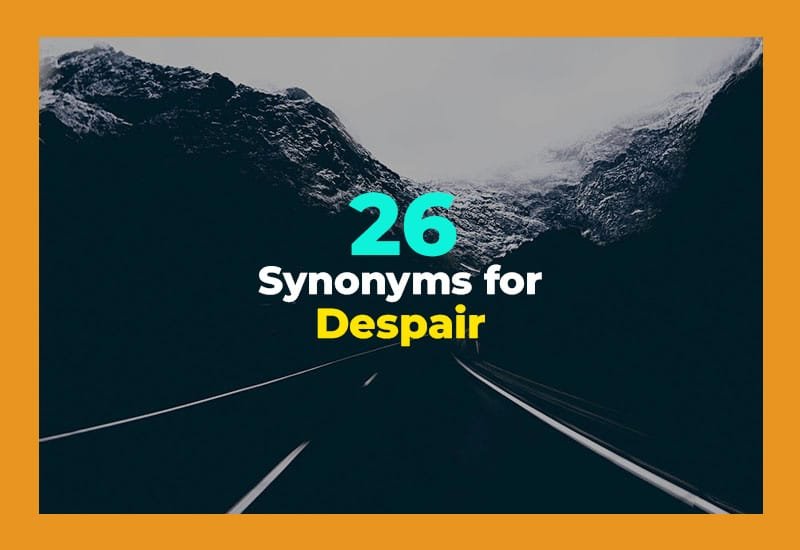Despair is a feeling we all encounter at some point, whether it's from disappointment, loss, or overwhelming challenges. Words like hopelessness, anguish, and despondency capture different shades of this emotion. Understanding these synonyms can help express emotions more precisely in writing or conversation. In this article, we'll explore 26 alternatives to despair with examples for each.
26 Different Ways to Say DESPAIR: Another Word for Despair
Hopelessness
Hopelessness represents a state where there seems to be no way forward. It captures the feeling of giving up entirely and seeing no possible solution to a problem. This synonym works well when describing emotional or mental states, especially when someone feels completely defeated. You might use it to convey prolonged struggle or a sense of futility in a situation. It reflects the inner void that despair often brings. Hopelessness is particularly useful in personal writing or reflective narratives.
- After months of searching for work, she sank into hopelessness.
- The constant failures left him in a state of hopelessness.
- Hopelessness filled the room after the news of the closure.
Desperation
Desperation is a more intense form of despair that often leads to drastic action. It captures the urgent need for relief or change. This word works when someone's situation feels critical and overwhelming, and they are ready to take risks. It reflects emotional intensity and urgency, making it ideal for storytelling or dramatic moments. Desperation often conveys both mental strain and physical effort.
- He called for help in sheer desperation.
- Her desperation led her to make a risky decision.
- Desperation could be seen in his trembling hands.
Misery
Misery focuses on the suffering and unhappiness that accompany despair. It's a broader term that can describe both emotional and physical pain. Misery works well when highlighting the depth of someone's struggle or their prolonged discomfort. It's often used in literature or personal accounts to evoke empathy. Misery emphasizes the lived experience of despair rather than just the feeling itself.
- The loss of her pet left her in deep misery.
- Misery surrounded the family after the accident.
- Years of unemployment caused him relentless misery.
Grief
Grief is an emotional response to loss, often intense and overwhelming. It is closely related to despair, especially when mourning a significant personal setback or death. Using grief highlights the emotional weight rather than just the sense of hopelessness. It's appropriate in personal narratives, counseling contexts, or reflective writing. Grief conveys sorrow, but also the process of coping with it.
- She was consumed by grief after her father's passing.
- Grief settled in slowly after the breakup.
- His grief was evident in every silent moment.
Sorrow
Sorrow is a gentler synonym for despair that communicates sadness and regret. It's versatile and works for both personal and shared experiences. Sorrow often implies reflective or enduring sadness, making it suitable for writing that explores emotional depth. It can also be used in poetic or literary contexts to evoke empathy. This term allows for a nuanced expression of despair without extreme intensity.
- Sorrow filled her heart at the news.
- He spoke with sorrow in his voice.
- The village was steeped in sorrow after the fire.
Distress
Distress conveys emotional strain, anxiety, or suffering. It emphasizes a reaction to external pressures or hardships. This synonym is useful when describing acute or ongoing challenges causing despair. Distress can apply to personal, social, or situational contexts, making it versatile for writing. It often implies a need for intervention or support.
- She was in distress over the upcoming exams.
- The child's distress was evident after the fall.
- Financial difficulties caused him immense distress.
Melancholy
Melancholy captures a reflective, deep sadness often linked to despair. It's slightly poetic and evokes a mood rather than an urgent feeling. This synonym works when expressing long-term or contemplative sorrow. Melancholy can enrich writing that explores the inner emotional world. It balances sadness with thoughtfulness, making it useful for creative or narrative contexts.
- A sense of melancholy hung over the empty house.
- He felt melancholy as he watched the sunset alone.
- Her songs were full of melancholy and longing.
Wretchedness
Wretchedness emphasizes extreme suffering, misery, or hopelessness. It conveys both emotional and physical dimensions of despair. This word is impactful in dramatic storytelling or vivid descriptions of hardship. Wretchedness often highlights the intensity of negative circumstances and can evoke sympathy or concern. It's best for situations where despair is overwhelming.
- The refugees lived in wretchedness and fear.
- He endured years of wretchedness after losing his job.
- Her wretchedness was visible in every movement.
Dejection
Dejection describes a state of low spirits or disappointment. It's a subtler form of despair, often connected to temporary setbacks. This synonym is helpful for expressing mild to moderate emotional downturns. Dejection captures both emotional and behavioral aspects, like slumped posture or quiet withdrawal. It works well in both conversational and literary contexts.
- He sank into dejection after the failed interview.
- Dejection covered her as she left the party.
- The team's dejection was evident after losing the match.
Despondency
Despondency indicates a loss of confidence or hope, similar to despair but slightly more formal. It suits written contexts, like essays or literature, where emotional precision is needed. Despondency conveys stagnation and discouragement, emphasizing the depth of despair. This synonym can describe both mental and emotional fatigue over prolonged challenges.
- Years of rejection led to his despondency.
- Despondency shadowed her daily life.
- His despondency grew as the project failed repeatedly.
Gloom
Gloom conveys darkness, sadness, or a sense of foreboding. It's effective for describing environments or emotional states linked to despair. Gloom can be literal or metaphorical, adding richness to storytelling. It emphasizes the weight of emotional heaviness rather than specific events. This word works well in descriptive writing or mood-setting.
- The gloomy sky reflected her mood perfectly.
- A sense of gloom settled over the office.
- His words were full of gloom and warning.
Anguish
Anguish expresses intense mental or emotional suffering. It's one of the strongest synonyms for despair, highlighting extreme pain or torment. This word works well in dramatic contexts, literature, or storytelling. Anguish communicates immediacy and depth of feeling, often making the reader feel the intensity. It is effective when you want to convey raw, overwhelming despair.
- She cried out in anguish at the news.
- Anguish filled him as he watched the disaster unfold.
- Years of loss had built an anguish he could not shake.
Affliction
Affliction refers to a cause of suffering or the state of suffering itself. It is useful for expressing despair linked to ongoing hardship. This synonym can describe physical, emotional, or social challenges. Affliction is versatile and works in formal, literary, or everyday contexts. It often evokes empathy and a sense of enduring struggle.
- The illness was a constant affliction in her life.
- His poverty was an affliction he endured quietly.
- They lived under the affliction of constant fear.
Heartache
Heartache communicates emotional pain or sadness often caused by loss or disappointment. It is intimate and personal, making it relatable for many readers. Heartache is effective in writing about relationships or personal struggles. It highlights the emotional consequences of despair, often in a tender or vulnerable way.
- She felt heartache after the breakup.
- The letters brought back old heartache.
- Heartache consumed him when he lost his closest friend.
Dismay
Dismay conveys shock, disappointment, or concern, often paired with despair. It is useful when describing sudden or unexpected events. Dismay works in both formal and informal contexts. It emphasizes emotional response rather than prolonged suffering. This synonym helps depict the immediate impact of negative events.
- The announcement caused widespread dismay.
- He faced dismay at the ruined plans.
- Her dismay was visible when she saw the damage.
Tribulation
Tribulation refers to difficulties or suffering, often over a long period. It works well to describe enduring despair caused by external circumstances. Tribulation is ideal for narratives or reflective writing that explores resilience. It emphasizes struggle, endurance, and the human experience of hardship.
- They endured years of tribulation during the war.
- Life's tribulations tested her patience.
- His tribulation made him stronger over time.
Bleakness
Bleakness conveys a lack of hope or comfort, often paired with despair. It is descriptive and sets a tone or atmosphere in writing. This synonym works well for both literal and figurative contexts. Bleakness emphasizes the emptiness or harshness of a situation. It is particularly effective in storytelling or mood-setting.
- The bleakness of winter matched his mood.
- Bleakness surrounded the abandoned town.
- Her future seemed filled with bleakness.
Dolor
Dolor is a literary term for grief or sorrow, making it suitable for formal writing or poetic contexts. It captures emotional suffering elegantly and emphasizes reflective despair. Dolor works well when exploring inner feelings or evoking sympathy. This synonym adds sophistication while conveying deep emotional weight.
- Dolor filled her heart after the tragedy.
- He expressed his dolor through poetry.
- The letter carried a sense of dolor that touched all readers.
Lamentation
Lamentation describes the act of expressing sorrow or grief, often vocally or publicly. It emphasizes communication of despair rather than internal feeling alone. Lamentation works in literary, historical, or dramatic contexts. It conveys both emotion and the process of coping. This synonym can make writing vivid and expressive.
- The community joined in lamentation after the disaster.
- Her lamentation echoed through the halls.
- Lamentation followed the loss of the beloved leader.
Downheartedness
Downheartedness expresses discouragement or lack of hope in a gentle, relatable way. It is effective for describing mild to moderate despair. This synonym works well in conversational writing, reflective pieces, or character exploration. Downheartedness emphasizes mood and demeanor over intense emotional suffering.
- He felt downheartedness after the defeat.
- Downheartedness made her withdraw from friends.
- The team's downheartedness was noticeable after the loss.
Futility
Futility describes a sense that efforts are pointless, often accompanying despair. It emphasizes the lack of results or progress, highlighting hopelessness. This synonym works well in philosophical, reflective, or dramatic writing. Futility conveys both frustration and resignation, making it powerful for emotional or intellectual contexts.
- The repeated attempts ended in futility.
- She realized the futility of arguing further.
- His efforts were met with futility at every turn.
Misfortune
Misfortune refers to bad luck or adversity that leads to despair. It emphasizes external causes rather than internal feelings. This synonym works well in storytelling or personal reflections. Misfortune can evoke empathy and highlight the randomness of life's challenges. It balances descriptive storytelling with emotional insight.
- Misfortune struck the family during the storm.
- He suffered misfortune at every step.
- The company's misfortune led to widespread layoffs.
Woe
Woe conveys great sorrow, distress, or misfortune, closely tied to despair. It is expressive and works well in both literary and conversational contexts. Woe emphasizes intensity and can create dramatic effect. This synonym captures the emotional weight of challenging circumstances vividly.
- Woe befell the kingdom after the invasion.
- Her eyes reflected deep woe.
- Woe followed him through the years of hardship.
Pessimism
Pessimism is a mindset that expects negative outcomes, often connected to despair. It describes a mental or emotional attitude rather than a single feeling. This synonym works in analytical, reflective, or narrative writing. Pessimism captures the anticipatory side of despair, showing how it influences thoughts and actions.
- His pessimism clouded every decision.
- Pessimism made her doubt her own abilities.
- The meeting was filled with pessimism about the future.
Oblivion
Oblivion describes complete emptiness or the state of being forgotten, often paired with despair. It emphasizes finality and total loss of hope. This synonym works well in dramatic, poetic, or reflective contexts. Oblivion captures extreme despair, especially when everything seems irrecoverable.
- He felt like sinking into oblivion after the betrayal.
- Oblivion surrounded her after the collapse of her dreams.
- The artist's work was lost to oblivion for decades.
| Synonym | Example |
|---|---|
| Hopelessness | After months of searching for work, she sank into hopelessness. |
| Desperation | Her desperation led her to make a risky decision. |
| Misery | Years of unemployment caused him relentless misery. |
| Grief | She was consumed by grief after her father's passing. |
| Sorrow | Sorrow filled her heart at the news. |
| Distress | The child's distress was evident after the fall. |
| Melancholy | A sense of melancholy hung over the empty house. |
| Wretchedness | The refugees lived in wretchedness and fear. |
| Dejection | He sank into dejection after the failed interview. |
| Despondency | Despondency shadowed her daily life. |
| Gloom | A sense of gloom settled over the office. |
| Anguish | She cried out in anguish at the news. |
| Affliction | The illness was a constant affliction in her life. |
| Heartache | She felt heartache after the breakup. |
| Dismay | Her dismay was visible when she saw the damage. |
| Tribulation | Life's tribulations tested her patience. |
| Bleakness | Bleakness surrounded the abandoned town. |
| Dolor | Dolor filled her heart after the tragedy. |
| Lamentation | The community joined in lamentation after the disaster. |
| Downheartedness | He felt downheartedness after the defeat. |
| Futility | She realized the futility of arguing further. |
| Misfortune | Misfortune struck the family during the storm. |
| Woe | Woe befell the kingdom after the invasion. |
| Pessimism | His pessimism clouded every decision. |
| Oblivion | He felt like sinking into oblivion after the betrayal. |

Final Thoughts
I hope this guide helps you explore the many ways to express despair. Using different synonyms allows you to convey emotions more vividly and connect with your audience on a deeper level. Words like anguish, melancholy, and despondency give texture to writing and help paint a true emotional picture. Exploring these alternatives can improve storytelling, personal reflection, and emotional expression in everyday communication.









